No Matter What – WHO Somalia stands with the communities we serve on World Humanitarian Day
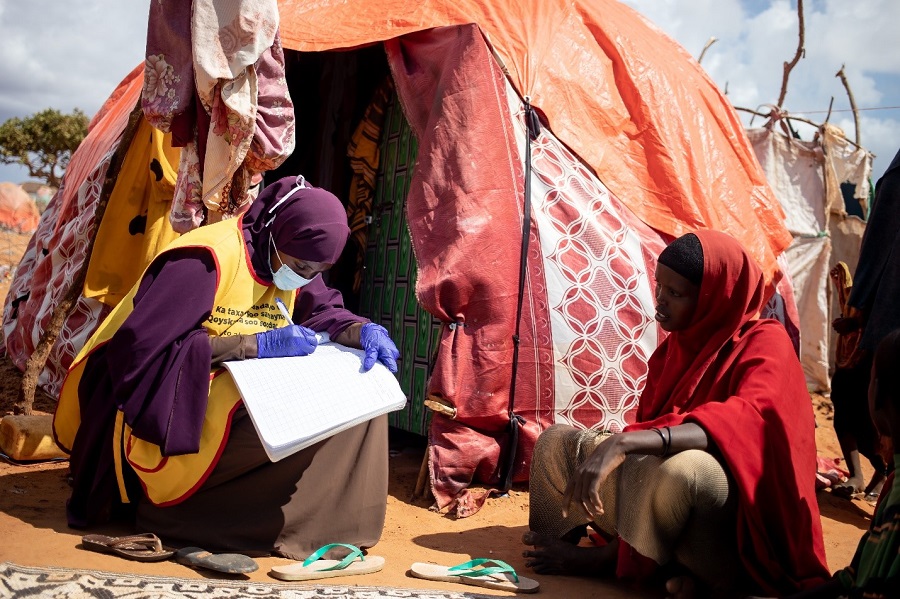 Health worker during house-to-house visits in camp for internally displaced people, Kismayo. Credit: WHO/Somalia
Health worker during house-to-house visits in camp for internally displaced people, Kismayo. Credit: WHO/Somalia
MOGADISHU, 20 August 2023 –The World Health Organization (WHO) country office of Somalia alongside the Government of Somalia, UN sister agencies and other partners marked World Humanitarian Day on 19 August 2023 under the global theme of “No Matter What”.
This occasion commemorates the day in 2003 when 22 of the United Nations colleagues lost their lives in an attack on the United Nations compound in Baghdad, Iraq. Since then, the humanitarian community across the world has been remembering the fallen heroes and showing their unwavering commitment to meeting the needs of the most under-served and marginalized communities during conflicts, climatic shocks and health emergencies.
With over half the population of Somalia (8.3 million people) in need of humanitarian assistance[1] and approximately 6.6 million people facing acute food insecurity[2], reaching out to these vulnerable populations with humanitarian aid including health services is crucial. Somalia has faced one of the most severe droughts in its history: 7.8 million have been affected and 1.4 million have been forced from their homes in search of food, water and health care.[3]
“WHO exists to save lives and ensure that every woman, man and child has access to health care – no matter what. Since the beginning of the drought, WHO has been racing against time to save the lives of the most vulnerable in Somalia and, with our humanitarian partners, have successfully pushed famine back. This would not be possible without the dedicated, skilled humanitarians that we work with every day,” said WHO Representative Dr Mamunur Rahman Malik. “With millions impacted by the ongoing drought, disease outbreaks and insecurity, our staff and partners, particularly front-line health care workers, are working in the most difficult circumstances to respond to multiple emergencies at the same time. They do this because of their commitment, dedication and the belief that together we can make a difference. Together, we will continue to serve the people of Somalia, no matter what,” he contended.
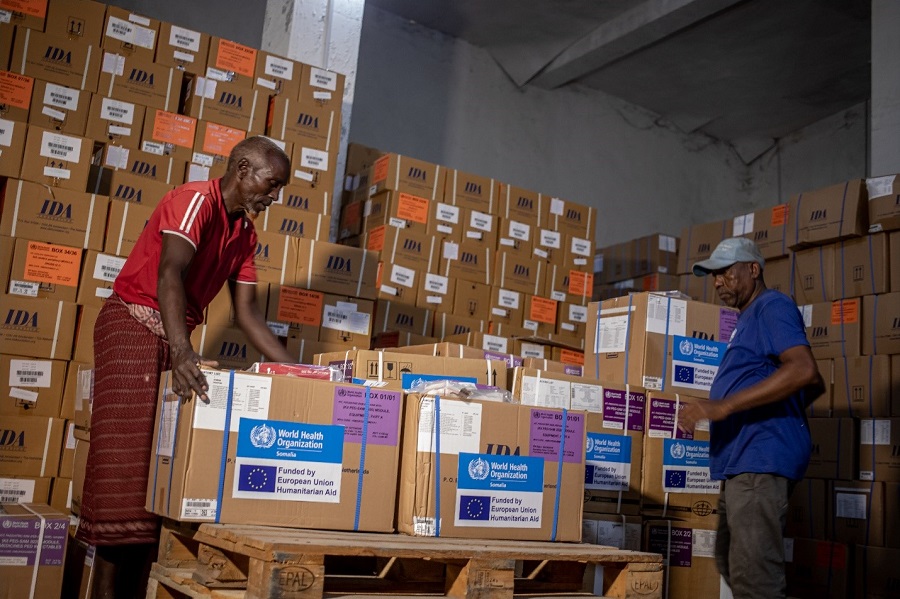 WHO Somalia is maintaining 3 warehouses across the country to maintain and sustain provision of life-saving health services across the country. Credit: WHO/Somalia
WHO Somalia is maintaining 3 warehouses across the country to maintain and sustain provision of life-saving health services across the country. Credit: WHO/Somalia
Since 2022, WHO Somalia has stepped up its integrated response to provide essential lifesaving health and nutrition services, to enhance community-based surveillance to detect and respond to disease outbreaks in a timely manner, and to improve coordination with all partners. WHO-deployed community health workers and outreach teams have brought healt hcare services directly to those who need them the most. Community health workers in towns and villages impacted by drought, as well as camps for internally displaced people, have screened children for malnutrition, referring the most severe cases to stabilization centres, which WHO has supported with essential supplies and capacity-building. At the same time, the threat of violence and terror attacks remains and WHO has been working with international experts, like UK-MED, to build the capacity of Somali first responders to offer lifesaving trauma care.
Besides meeting the immediate humanitarian needs of the local populations, WHO is also working to build the resilience of the health system to respond to future shocks and better meet the needs of the populations it serves. In partnership with the Ministry of Health and other stakeholders, WHO is conducting capacity-building, providing essential supplies, and in some cases upgrading and solarizing entire health facilities. In this way, the WHO country office is working across the development-humanitarian-peacebuilding nexus, to support the health system and infrastructure of Somalia for now and for years to come.
WHO Somalia is grateful to the donors and partners who have supported this work, including ECHO, FIND, the governments of Germany, Japan and the United Kingdom, donors contributing to the Central Emergency Relief Fund and WHO’s Contingency Fund for Emergencies.
---------------------
For additional information, please contact:
Kyle DeFreitas
External Relations Officer
Fouzia Bano
Communications Officer
Related links
Please see the links below for additional information on WHO Somalia’s humanitarian work:
An overview of Drought situation in Somalia: Drought Video wr 2023 (1) | WHO Somalia | Flickr
[1] https://reliefweb.int/report/somalia/somalia-humanitarian-response-plan-february-2023
[2] https://reliefweb.int/report/somalia/somalia-ipc-food-security-nutrition-snapshot-march-june-2023-published-april-25-2023
[3] https://reliefweb.int/report/somalia/somalia-drought-response-and-famine-prevention-15-november-15-december-2022
Five-day cholera vaccination campaign rolled out in Mandela triangle to protect over 600 000 Somalis in bordering areas of Kenya, Ethiopia
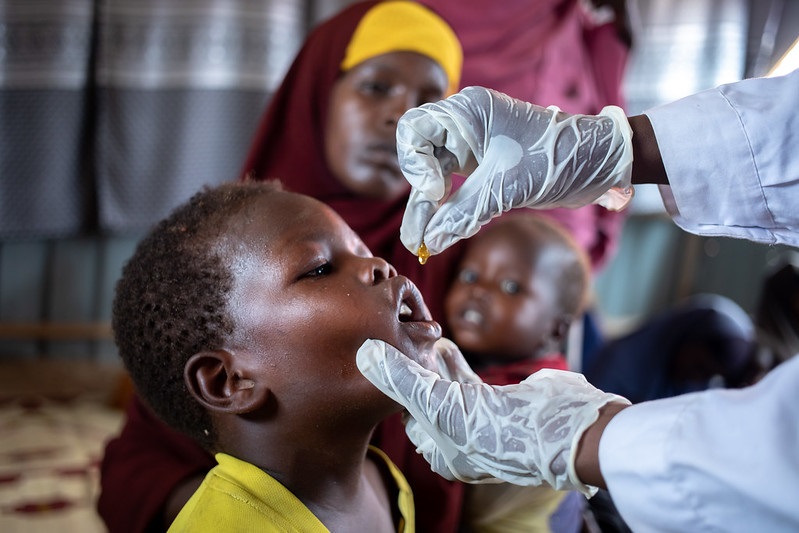 Five-day single dose reactive cholera vaccination campaign begins in 5 districts of Jubaland State bordering Kenya and Ethiopia. Credit: WHO/ Somalia
Five-day single dose reactive cholera vaccination campaign begins in 5 districts of Jubaland State bordering Kenya and Ethiopia. Credit: WHO/ Somalia
Mogadishu, 13 August 2023 – A single dose reactive cholera vaccination campaign gets under way in 5 districts of Jubaland State, bordering Kenya and Ethiopia, classified as the Mandela triangle, from 12 to 16 August, 2023. The campaign aims to vaccinate 590 803 people aged one year and above, including pregnant women in Afmadow, Belet Xaawo, Luuq, Doolow, Dhobley districts. The oral cholera vaccination campaign will be synchronized among border communities with Ethiopia and Kenya.
The 5-day house-to-house campaign will be implemented by 788 vaccination teams each composed of 2 vaccinators, data clerk and cold chain attendant. Each team will be supported by a social mobilizer. The World Health Organization (WHO) and United Nations Children’s Fund (UNICEF) are supporting the Federal Ministry of Health and Human Services and State Ministry of Health of Jubaland State to conduct the campaign. Gavi - the Vaccine Alliance, is providing vaccines and funds to implement this life-saving intervention. As of the end of July 2023, 11 704 suspected cases of cholera, with 30 associated deaths, were reported from 28 drought-affected districts in Somalia. Around 54% of these cases were children aged under 5: 52% of them were girls.
The Minister of Health of Jubaland State H.E. Ismail Ahmed Garas expressed deep gratitude to Gavi for this timely support to stop the spread of cholera and measles in the Mandela triangle. He said, “We are thankful to both WHO and UNICEF for their continued technical and operational support in preparing health workers, social mobilizers and data collectors for this very critical and life-saving cholera vaccination campaign. Our health system might be weak and fragile but our resolve to save lives is firm and together with our trusted partners we are hopeful that this intervention will help stop the transmission of cholera and measles and save scores of precious lives.”
Since 2017, Somalia has witnessed uninterrupted cholera outbreaks. These can be attributed to a large number of people having poor access to safe water and sanitation services, and natural hazards, including drought and floods, further exacerbated by protracted conflict and large-scale population displacement. Meanwhile, the ongoing drought and other climatic shocks in the country has had a grave impact on Somalis – while displacing over 770 000 people internally. It has dried up surface water sources and led to food insecurity in communities, which increases the risk of cholera infection, as well as other waterborne diseases. An estimated 49% of the population – 7.7 million people – require some form of humanitarian or protection assistance in Somalia, of whom 6.13 million are estimated to be affected by the current drought.
WHO Representative to Somalia Dr Mamunur Rahman Malik said, “Somalia might have averted the threat of a famine but not the threat of disease, because the prolonged drought is showing a real and life-threatening impact on the lives of the people across the country and especially in Mandela triangle. It’s a race against time to try to prevent major outbreaks of cholera and measles.”Emphasizing the need for a collective and timely response, he added, “Cholera and measles can spiral out of hand in no time because of its contagious nature, therefore, we just cannot wait and see this unfolding crisis balloon out of our hands. Our collective emergency response to the global pandemic of COVID-19 is just living proof of how timely collaborative action and delivery of a high-quality and evidence-based intervention can lead to protecting the health and well-being of populations, even if the health system is fragile.”
While cholera remains endemic in Somalia and the current drought situation may have exacerbated the risk of a major outbreak across the country, vaccination against cholera with a single dose is used as a supplementary measure to control any possible outbreak and spread across the region. To curb the transmission of cholera and other waterborne diseases, the Ministry of Health, with the support of WHO and UNICEF, will be raising awareness among the target populations on precautionary measures like maintaining good personal hygiene, improving access to safe water, practising safe sanitation, scaling up active surveillance, community engagement and sensitization. Since January 2023, over 1.4 million people in 15 drought-affected districts have received a single dose cholera vaccine.
For additional information, kindly contact:
Khadar Hussein Mohamud
Head of Coordination and Communications
Ministry of Health
Federal Government of Somalia
Mukhtar Abdi Shube
Head of the Expanded Programme on Immunization (EPI) section
Ministry of Health
Federal Government of Somalia
Fouzia Bano
WHO Chief of Staff ai
Communications Officer
Lisa Hill
UNICEF Communications Specialist
Related links
Drought Video wr 2023 (1) | WHO Somalia | Flickr
Ministry of Health and WHO commemorate World Breastfeeding Week in Somalia
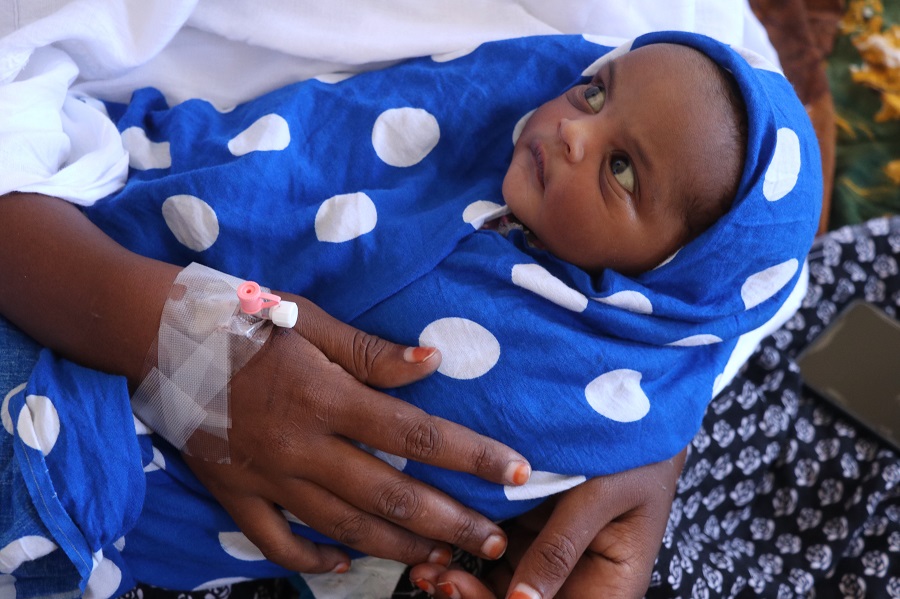 Early initiation and exclusive breastfeeding are crucial for the healthy growth and development of newborns. Credit: WHO/Somalia
Early initiation and exclusive breastfeeding are crucial for the healthy growth and development of newborns. Credit: WHO/Somalia
Mogadishu 4 August 2023 – The Federal Ministry of Health and the World Health Organization (WHO) Somalia country office join the international community and partners in commemorating World Breastfeeding Week, which is held annually from 1 to 7 August to highlight the importance of breastfeeding for both mothers and children.
This year's theme, "Let’s make breastfeeding and work, work," focuses on workplace barriers that prevent women from breastfeeding or cause them to stop breastfeeding earlier than recommended. The Federal Ministry of Health and WHO country office are urging all partners to work together to establish breastfeeding-friendly environments in all health care facilities and workplaces across the country to promote and enhance exclusive breastfeeding rates among Somali women.
Somalia has some of the highest rates of neonatal and under-5 mortality in the world, with an under-5 mortality rate of 117 per 1000 live births. In addition, more than 1.8 million children under 5 are currently at risk of severe malnutrition and related health complications due to the ongoing drought crisis. Undernutrition is a global concern associated with 45% of all child deaths annually. If all children between 0 and 23 months are optimally breastfed, over 820 000 children's lives could be saved each year.
To provide optimal infant protection, WHO and UNICEF recommend initiating breastfeeding within the first hour of birth and continuing exclusively for 6 months. Breast milk contains essential antibodies and nutrients that promote healthy growth and development. In Somalia, only 60% of children are breastfed within the first hour of birth, and just 34% of infants under 6 months are exclusively breastfed. This can cause dietary deficiencies, which are prevalent among children of all age groups in Somalia. Such deficiencies can result in childhood illnesses like respiratory diseases, diarrhoea, wasting and stunting. Hence, it is crucial for children to have good nutritional status to support their growth and development.
The Federal Ministry of Health, at both the federal and state levels, recognizes the significance of breastfeeding and has prioritized it in the national health sector strategic plans. "Breastfeeding provides numerous health benefits for both newborns and mothers. Therefore, it is important to create supportive environments that are conducive to breastfeeding at all levels of society,” said Farhan Mohamed, Head of the Nutrition Unit at the Federal Ministry of Health. “Breastfeeding also has the potential to reduce health costs and result in economic gains for families and the nation as a whole,” he added.
To promote and improve breastfeeding practices, the WHO country office supports the Federal Ministry of Health in implementing the national nutrition strategy 2020-2025, with the primary goal of increasing the number of babies aged 0–6 months old who are exclusively breastfed to above 50% by 2025. Additionally, as part of drought response efforts, WHO provides vitamin A supplementation and/or micronutrient supplements to children under 5 and pregnant women. WHO also supports the Ministry in implementing the maternal, infant and young child nutrition plan and provides technical support and capacity-building for health care workers.
This important work is made possible thanks to the generous funding from the Delegation of the European Union (EU), European Commission Humanitarian Aid & Civil Protection (ECHO), and Central Emergency Response Fund (CERF). WHO takes the technical lead in maternal, newborn and child health and Dr Al-Umra Umar noted, “By promoting breastfeeding, Somalia can strengthen its health care system, reduce health care associated expenses, and promote a productive and safer workplace and healthier workforce for the future.”
For additional information, please contact:
Kyle DeFreitas
External Relations Officer
Fouzia Bano
Communications Officer
Related links
WHO launches training to transform care of mothers and newborns in Somalia
The Federal Ministry of Health and WHO renew their commitment to eliminating viral hepatitis in Somalia on World Hepatitis Day
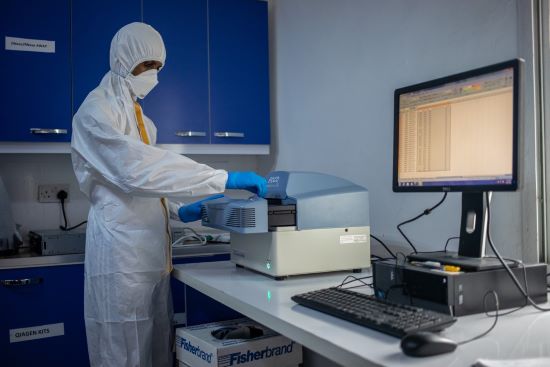
Mogadishu, 28 July 2023: The Federal Ministry of Health and the World Health Organization (WHO) country office in Somalia join together in commemorating World Hepatitis Day to increase awareness and understanding of viral hepatitis.
This year, the hepatitis campaign will be under the slogan of “One Life, One Liver” emphasizing the link between viral hepatitis infection and liver inflammation. In the WHO Eastern Mediterranean Region, a regional slogan, “Hepatitis medicines are cheaper now. Treat to save lives”, is also being used to highlight efforts to accelerate the elimination of hepatitis by ensuring that testing and treatment are available to those who need it the most. Although the Federal Ministry of Health, together with WHO and other partners, has made progress in improving access to hepatitis testing and treatment, the road towards elimination is a long one.
Hepatitis, a viral infection that primarily affects the liver and can cause lasting damage and inflammation, is a global health concern that particularly affects low- and middle-income countries, including Somalia. Limited resources, insufficient health care infrastructure and low awareness all contribute to high transmission rates and limited access to testing and treatment.
Globally, viral hepatitis B (HBV) and C (HCV) are responsible for 1.1 million deaths annually due to chronic liver disease and cancer, with almost 80% of cases going undiagnosed. Marginalized communities, including internally displaced persons (IDPs), are particularly vulnerable and tend to experience a greater disease burden.
In Somalia, limited data availability adds to the challenges of combating viral hepatitis. Most available data are from blood transfusion screenings, with recent data indicating a decline in seropositivity rates for HBV and HCV: HBV seroprevalence dropping from 4.6% in 2012 to 1.9% in 2021 and HCV from 0.42% to 0.09% during the same period. Despite this progress, 2.5 million people in Somalia are estimated to live with chronic HBV and HCV.
The National Hepatitis Programme Manager at the Federal Ministry of Health, Dr Aweiys Hersi Hashi, while acknowledging the critical support extended by the WHO country office in managing the disease burden of hepatitis in the country, including through blood transfusion screenings and integrating the HBV vaccine into childhood immunization schedules, says: “We are struggling to expand these services to every part of the country for which we will urge the partners to support WHO and the Ministry to expand the service to ensure the goals of universal health coverage in Somalia could be achieved.”
HIV treatment regimens also incorporate drugs effective against both HIV and hepatitis viruses, such as tenofovir and lamivudine, providing dual benefits for co-infected individuals. Dr Rogers Busulwa from the WHO country office emphasises that: “Collecting data is crucial for understanding the burden of viral hepatitis beyond blood donor populations. It is also critical to prioritize the prevention of mother-to-child transmission of hepatitis. There is significant potential to leverage the efforts of the HIV programme to support these efforts.”
During the COVID-19 pandemic, WHO established seven public health laboratories equipped with real-time polymerase chain reaction (PCR) technology, which has been instrumental in increasing national diagnostic capacity. In addition to SARS-COV-2, these laboratories can detect various pathogens, including hepatitis viruses. The utilization of PCR technology holds great potential for timely diagnosis and treatment of hepatitis, preventing complications and the spread of the virus.
The Federal Ministry of Health and WHO country office, together with partners, are working to achieve the global goal of eliminating viral hepatitis by 2030. To reach this goal, WHO supports the federal and state ministries of health in enhancing access to universal health coverage, including hepatitis testing, treatment and vaccines.
For additional information, please contact:
Kyle DeFreitas, External Relations Officer,
Fouzia Bano, Communications Officer,
Note to Editors:
Please see the link below for additional information on WHO’s response across Somalia:
Commemorating Zero Discrimination Day: reducing stigma against HIV/AIDS


